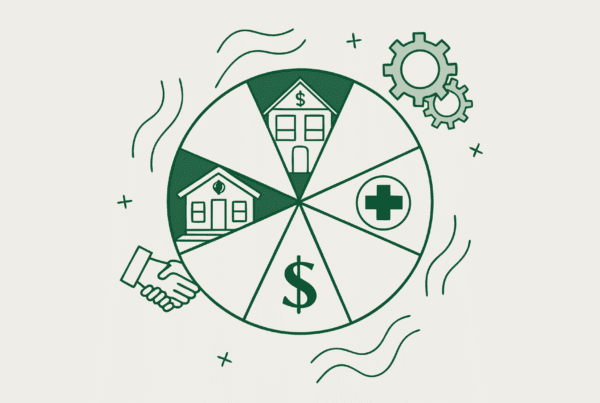Selling your oncology practice in West Virginia involves navigating a unique market. The state’s high demand for cancer care creates significant opportunity, but consolidation and financial pressures mean that a successful sale requires careful strategy. This guide provides a direct look at the current landscape, key considerations for practice owners, and how to prepare for a transition that maximizes your practice’s value and protects your legacy.
Curious about what your practice might be worth in today’s market?
Market Overview
The market for oncology practices in West Virginia is shaped by a distinct set of factors. The state’s demographic and healthcare trends create a compelling environment for practice sales, but it comes with specific challenges you need to understand.
High Demand Meets Unique Challenges
West Virginia’s higher-than-average cancer rates mean there is a consistent and pressing need for oncology services. This underlying demand makes established practices attractive to buyers seeking to enter or expand in the region. However, particularly in rural areas, practices can face headwinds with staffing and recruitment. For a seller, this means your stable, experienced team is one of your most valuable assets. For a buyer, it presents a clear opportunity to acquire a turnkey operation in an underserved market.
The Role of Major Health Systems
You cannot ignore the influence of large players. WVU Medicine, for example, is making significant capital investments to expand healthcare access across the state. This activity brings both competition and opportunity. It raises the profile of West Virginia’s healthcare sector and creates a class of well-capitalized strategic buyers looking for established community practices to join their growing networks.
Key Considerations for West Virginia Owners
Beyond market dynamics, selling an oncology practice in West Virginia requires navigating a specific set of regulatory and financial hurdles. Getting these details right from the start is critical for a smooth transaction. Many practice sales encounter unexpected challenges during due diligence, but preparing for these key areas can prevent that.
| Consideration | Why It Matters for Your Sale |
|---|---|
| WV Corporate Practice of Medicine (CPOM) | West Virginia law restricts who can own a medical practice. This directly impacts the structure of your deal, especially with private equity buyers. Your sale must be structured to comply. |
| Financial Pressures & Reimbursement | High drug costs and complex reimbursement models like CMS’s EOM can squeeze margins. Buyers will scrutinize your revenue cycle management and payer contracts. A clean, profitable financial story is a must. |
| Federal & State Compliance | Your practice must demonstrate compliance with Stark Law, the Anti-Kickback Statute, and physician non-compete agreements. Any past issues can become major roadblocks if not addressed properly. |
| Practice Goodwill & Staffing | In a state with recruitment challenges, your tenured staff and community reputation are significant assets. Protecting these during the transition is not just good practice; it’s a key part of your valuation. |
The due diligence process is where many practice sales encounter unexpected challenges.
Market Activity and Buyer Landscape
The national trend of healthcare consolidation is very active in oncology, and West Virginia is no exception. Independent community practices are at a “tipping point,” making this a critical time to understand who is buying and what they want. We do not just “list” your practice; we run a process designed to create competitive tension between qualified buyers.
The Rise of Private Equity
Since 2012, private equity (PE) firms have become major buyers of physician practices, including oncology. A PE buyer is typically looking for a strong “platform” practice with growth potential. They are focused on financials, operational efficiency, and opportunities to expand services or enter new markets. They often bring sophisticated business management, but sellers worry about losing control. This is a common fear, but the right deal structure can ensure you retain clinical autonomy while benefiting from the firm’s resources.
Consolidation and Strategic Buyers
Local and regional health systems, like WVU Medicine, are also active “strategic” buyers. Their goal is often to expand their geographic footprint and build a more integrated cancer care network. For these buyers, your practice’s referral patterns, patient base, and location are just as important as your financials. Selling to a strategic buyer can be a great way to secure your practice’s legacy within the community.
The 4 Phases of a Successful Practice Sale
Selling your practice is a structured process, not a single event. Many owners think they should wait until they are ready to exit to start planning. That could not be more wrong. Buyers pay for proven performance, not potential. Starting the process 2-3 years before your target exit date is how you sell on your terms, not theirs. Here are the four key phases.
-
The Preparation Phase. This is where most of the value is created. It involves getting your financial statements in order, cleaning up any compliance issues, and gathering the documents a buyer will need for due diligence. Proper preparation can significantly increase your final practice value.
-
The Valuation and Marketing Phase. Here, we establish what your practice is truly worth based on its performance and market conditions. Then, we confidentially approach a curated list of qualified buyers with a compelling narrative about your practice’s strengths and growth opportunities.
-
The Negotiation Phase. After receiving initial offers, or Letters of Intent (LOIs), we manage negotiations to secure the best possible terms. This goes beyond the price to include your future role, staff retention, and the overall deal structure.
-
The Due Diligence and Closing Phase. Once an LOI is signed, the buyer conducts a deep dive into your practice’s financials, operations, and legal standing. Our role is to manage this intense process, provide information efficiently, and keep the deal on track toward a successful closing.
A comprehensive valuation is the foundation of a successful practice transition strategy.
How Your Oncology Practice is Valued
One of the biggest questions every practice owner has is, “What is my practice worth?” The answer is more complex than a simple revenue formula. Sophisticated buyers value your practice based on a key metric: Adjusted EBITDA (Earnings Before Interest, Taxes, Depreciation, and Amortization).
This isn’t just the profit on your tax return. We calculate your true earning power by adding back owner-specific personal expenses and normalizing salaries to market rates. This adjusted number gives a clear picture of the practice’s profitability to a new owner. That Adjusted EBITDA is then multiplied by a number (a multiple) to determine the Enterprise Value. That multiple is not fixed; it changes based on several key factors.
| Factor | How It Influences Your Valuation Multiple |
|---|---|
| Practice Scale & Profitability | Practices with higher Adjusted EBITDA (e.g., over $1M) command higher multiples because they represent a lower risk to buyers. |
| Provider Model | A practice that relies less on a single owner and has associate physicians or PAs is more valuable. It demonstrates the business can thrive after you transition. |
| Growth Story | Can you show a history of growth? Are there clear opportunities for a new owner to add ancillary services or expand? A compelling growth narrative earns a premium valuation. |
| Payer Mix | A healthy mix of commercial insurance payers is seen as more stable and valuable than a heavy reliance on lower-reimbursing government payers. |
Valuation multiples vary significantly based on specialty, location, and profitability.
Planning for Life After the Sale
The day you sign the closing documents is a beginning, not an end. A successful transition plan considers what happens on day two and beyond, both for you and for the practice you built. Thinking through these elements during negotiations is vital to protecting your legacy and financial future. Your legacy and staff deserve protection during the transition to new ownership.
-
Ensuring a Smooth Transition. A key concern for buyers is patient and staff retention. A well-designed transition plan that keeps your team in place and assures patients of continued quality care is a critical part of any deal. Good planning here protects the goodwill you worked so hard to build.
-
Defining Your Future Role. Do you want to continue practicing for a few years, or are you ready to retire? Your post-sale role and the terms of your non-compete agreement are major points of negotiation. We help structure arrangements that align with your personal goals, whether that means staying at the helm or walking away entirely.
-
Structuring Your Payout. The best deals often include more than just cash at closing. An “equity rollover,” where you retain a minority stake in the new, larger company, gives you a potential second payday when the new entity is sold again years later. It is a powerful way to share in the future growth you helped create.
The right exit approach depends on your personal and financial objectives.
Frequently Asked Questions
What are the key market factors influencing the sale of an oncology practice in West Virginia?
West Virginia’s oncology practice sales are influenced by high cancer rates creating strong demand for services; challenges in recruitment, especially in rural areas; and the presence of major health systems like WVU Medicine that act as strategic buyers and increase competition.
How does West Virginia’s Corporate Practice of Medicine (CPOM) law affect the sale of an oncology practice?
The CPOM law restricts who can own medical practices in West Virginia, which impacts how the sale can be structured, particularly when selling to private equity buyers. Compliance with this law is critical to ensure the deal is legally sound.
What financial and compliance considerations must be addressed when selling an oncology practice in West Virginia?
Sellers must ensure their financial records are clean and profitable, addressing reimbursement complexities and drug costs. They also need to demonstrate compliance with federal and state laws like Stark Law, Anti-Kickback Statute, and physician non-compete agreements to avoid roadblocks during due diligence.
Who are the typical buyers of oncology practices in West Virginia?
Typical buyers include private equity firms looking for profitable platform practices with growth potential and regional health systems such as WVU Medicine that aim to expand their cancer care networks by integrating community practices.
What steps should I take to maximize the value of my oncology practice before selling in West Virginia?
Start preparing 2-3 years in advance by cleaning financials, resolving compliance issues, and organizing due diligence documents. Develop a compelling growth narrative, protect your practice’s goodwill and staffing, and engage in a structured sales process involving valuation, marketing, negotiation, and due diligence to maximize your practice‚Äôs value.



